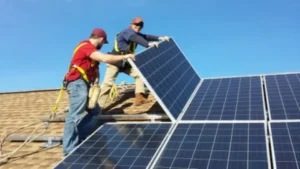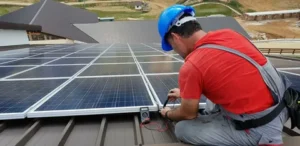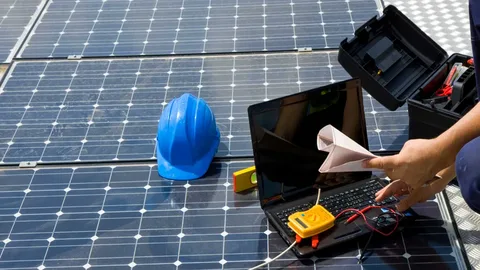Are you tired of increasing electricity bills and trying to find smart and sustainable solutions to power your house? Thousands of Ontario homeowners are switching to solar energy and they have good reason. As the cost of hydro keeps going up, solar technology is getting better and a strong push towards renewable energy. It is an eco-friendly power option, but rather a financially prudent choice.
This all-inclusive guide will tell you all you need to know about solar panel installation, efficiency, lifespan, cost savings, and maintenance etc to make the right decision.
What is a Solar panel?
A solar panel is a gadget consisting of photovoltaic (PV) cells, which capture the sunlight and transform it into useful electricity. These modules are the core of a solar energy system and are made to produce clean and renewable power to your home or business.
Rooftop solar panels are usually put in place by people who own their own homes, to save on their hydro bills, lessen their carbon footprint and less rely on conventional sources of energy.

Why Switching to Solar Power Is the Smart Decision?
Ontario is one of the most favourable provinces in Canada to produce solar power with an average of 2,000 hours of sunshine annually. Solar panels are very efficient even in colder months since they become especially efficient at lower temperatures. By putting solar panels you can:
- Minimize or even remove monthly electricity bills.
- Get government rebates and incentives.
- Grow the value of your property.
- Minimize the carbon footprint and contribute to a better environment.
How Do Solar Panels Work?
Photovoltaic effect is a process of harnessing sunlight using solar panels and converting it into usable electrical energy. The solar panels consist of photo-voltaic (PV) cells that capture the sunlight and produce direct current (DC) power. Because of the use of alternating current (AC) in homes, the DC power is converted to AC electricity using an inverter, thus allowing it to be used in the home.
The extra energy generated by your panels can be stored in solar batteries or be sent back to the grid through the Net Metering Program and you will be credited with your hydro bill. Here is how it works:
Sunlight Capture : PV cells absorb the sunlight and generate direct current (DC) electricity.
Conversion Process : A solar inverter will convert DC into alternating current (AC) that drives your home.
Energy Usage & Storage : Use the power instantaneously or store it in batteries.
Net Metering : Any surplus electricity can be directed to the grid and you are credited a bill.
This is an efficient process that allows you to produce clean energy and at the same time save money in the long term.
Solar Panel Efficiency in Ontario
The efficiency of solar panels is defined as the percentage of sunlight that your panels use to produce usable energy. There are a number of factors in the Canada climate that affect performance:
Panel Type : Monocrystalline panels are more efficient than polycrystalline.
Roof Orientation : South Facing roofs catch the greatest amount of sunlight.
Shading Issues : Trees, chimneys, and adjacent buildings decrease production.
Weather Conditions – Canada has a sunny summer that enhances performance; snow in winter can slow down the production in the short run.
What is the Lifespan of a Solar Panel?
Solar panels are stable and they usually come with 25 to 30 years performance guarantees. However, when well maintained, they can exceed 35 years. Most panels will keep on running at 80 to 90 percent capacity after 20 years. The efficiency can be slightly reduced with time, and most panels will continue to run at 80 to 90 percent capacity after 20 years.
How Much Energy Can Solar Panels Produce?
The climate is very favorable to generate solar power. A 1 kW solar system generates approximately 1,100 to 1,200 kWh of electricity per annum on average. This means:
- Approximately 5,500 to 6,000 kWh per year can be obtained under a 5 kW system.
- A 10 kW system will produce 11,000 to 12,000 kWh of power in a year.
This can subsidize the majority, maybe all, of the electricity used by many households.
Solar Panel Installation Cost in Ontario
It will require increased initial expenses to install solar panels, but the savings will be significant over the long run.
| System Size | Average Cost (Before Rebates) | Estimated Annual Savings | Payback Period |
| 3 kW | $8,000 – $10,000 | $500 – $700 | 10–12 years |
| 5 kW | $12,000 – $15,000 | $800 – $1,200 | 8–10 years |
| 10 kW | $20,000 – $28,000 | $1,600 – $2,200 | 6–8 years |
Factors Affecting Cost:
- Panel Type Monocrystalline vs. polycrystalline
- System Size & Energy Needs
- Installation Complexity
- Labor & Permit Fees
Government Incentives & Solar Rebates in Ontario (2025)
There are a number of federal and provincial programs that homeowners can enjoy:
- Canada Greener Homes Grant – Get up to $5,000 to install solar panels.
- Net Metering Program – Export the surplus energy to the grid and get bill credits.
- Tax / Financing Opportunities Municipalities provide low-rate solar loans.
These programs make solar more accessible and cost-effective.
How to Install Solar Panel A Complete Guide
The process of installing solar panels is a complex one to make sure the panels work best and are compliant with the regulations. Here is a step-by-step overview:
Initial Consultation and Quote
The process begins with the homeowners contacting licensed solar installers for an evaluation. At this step, professionals will assess the energy requirements of your house and the functionality of your roof to offer you a custom installation map.
Site Assessment
The installer checks the orientation of your roof, its tilt, its shading and space available. This stage identifies the best size and placing position of the panels to achieve the highest efficiency.
System Design and Agreement
You will be presented with an offer that will lead to the panel layout, energy expectations, warranties, and prices. As soon as you are satisfied with the plan, you sign a service agreement.
Permits and Applications
The installer takes care of paperwork to obtain required permits and net metering approval by your local utility company.
Installation and Wiring
The inverters, wiring, and solar panels are installed. This can last between one to three days depending on the size of the system.
Final Inspection and Activation
Once installed, your utility company checks the system and confirms compliance and safety. After approval, your solar panels are then connected to the grid and begin to produce electricity.

Do You Need Permits for Solar Installation in Ontario?
Yes. Most Canadian people need a permit before they install solar panels. Typically, you will need:
- Building Permits – any rooftop installations over a specific size will require building permits.
- Electrical Permits – Certifies the system to the Electrical Safety Code.
- Net Metering Approvals – Required in case you are going to connect your system to the grid.
Your professional installers take care of all the permit business on your behalf to make sure your system meets local requirements.
Do Solar Panels Require a Lot of Maintenance?
Not at all! Solar panels have no moving parts, which means that they are low-maintenance. In Canada, the majority of homeowners just require:
- Dust and snow removal by periodic cleaning of the panels.
- Wire check/performance inspections every year.
- Professional maintenance plans that are optional and most efficient.
- Your panels will work many decades with the least care.
Is It Better to Lease or Buy Solar Panels?
You will have to choose between leasing and buying solar panels when it comes to installing them:
Leasing Solar Panels
- Pros: Simple maintenance, less expensive to buy initially, extended contracts.
- Cons: You do not own the system and you may not make as much savings in the long term.
Buying Solar Panels
- Pros: Maximum long term savings, higher home value and complete ownership.
- Cons: Requires greater initial outlay.
Unless the initial investment is prohibitive, purchase is usually preferable since it will provide you with all the advantages of rebates, incentives, and long-term energy savings.
Conclusion
Finally, solar panel installation in Ontario is among the smartest investments you can ever make, both financially and environmentally. Solar energy benefits homeowners in the long run by decreasing energy bills and also decreasing carbon emissions. You can ensure that your solar panels work and pay back by learning how solar panels operate, investigating financing, and selecting certified installers. As the cost of energy increases and the government offers incentives to turn to solar power, this can be the best time to go for solar cells.
FAQs
Will solar panels increase my home’s value?
Yes! In Ontario, houses equipped with solar panel systems have high selling prices within a short time period.
Do I need batteries for my solar panel system?
Not necessarily. The vast majority of Ontario homeowners opt to install grid-tied systems with net metering, which reduces the expensive expense of installing batteries.
How do I choose the best solar installer?
Find qualified contractors who have good reviews of customers, clear prices, and who have local experience. Always make comparisons of at least three quotes.
Do solar panels require regular maintenance?
No, the solar panels require very little maintenance because they do not have moving components.
Do solar panels work during Ontario’s winter months?
Yes, the solar panels can be used even during cold weather. Although snow can cause short term efficiency reduction.



